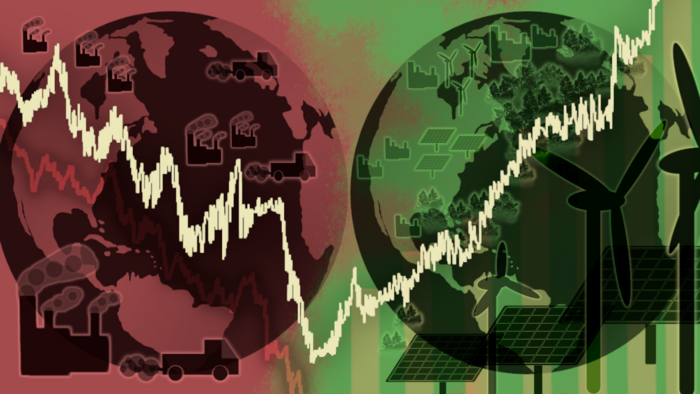Crises can accelerate structural change and spur an absolute decoupling of CO2 emissions from economic growth. Countries that have already embarked on an ambitious path towards climate action have proven themselves particularly adept in times of need.

Credit: RIFS/Felix Beger
Crises can accelerate structural change and spur an absolute decoupling of CO2 emissions from economic growth. Countries that have already embarked on an ambitious path towards climate action have proven themselves particularly adept in times of need.
“ ‘Building back better’ is a popular catchphrase in times of crisis, but can it work? In our new study, we explored the impact of economic crises on decarbonization, and showed that although crises do not automatically lead to structural changes and long-term decarbonization, they have played an important role in triggering systemic change. Almost all countries that have peaked their CO2 emissions did so during an economic crisis”, says first author Germán Bersalli from the Research Institute for Sustainability (RIFS) in Potsdam, Germany. Together with colleagues from RIFS and ETH Zurich, he investigated the relationship between emissions peaks and economic crises in the 45 countries that were members of the OECD and the G20 between 1965 and 2019.
At least twenty-eight of these countries peaked their emissions over the past fifty years, with 26 doing so just before or during an economic crisis, suggesting that crises have an effect on national decarbonization processes. These include the 1973-75 and 1979-80 oil crises, the collapse of the Soviet Union (1989-91), and the Global Financial Crisis (2007-09). Even when economic activity in these countries picked up again, emissions did not return to their pre-crisis levels. This positive development contrasts with the broader global trend of a steady increase in carbon dioxide emissions over this period, punctuated by small dips during crises.
The researchers describe three mechanisms that can spur long-lasting decarbonization processes in the context of economic crises:
Energy efficiency measures taken by governments and firms in response to rising energy prices or deteriorating economic conditions. “This mechanism is particularly evident during the oil crises. Countries that peaked during this period – for example, the UK, Germany and France – saw significant improvements in energy intensity. The consumption of expensive imported fuels decreased, and industrial efficiency increased,” says Bersalli. In addition to government actions, companies also responded to crises and triggered new market trends, such as a shift to smaller and more efficient cars in Western Europe during the oil crises.
Changes in the economic structure due to the decline of carbon-intensive industries and a post-crisis upturn for less energy-intensive industries. This change is driven by economic and, sometimes, political forces. As economies recover, companies increasingly turn to less energy- or carbon-intensive production lines and facilities, paralleled by an uptick in service sector activities rather than manufacturing. Bersalli cites Spain as a notable example of this phenomenon: “In Spain, among the hardest-hit countries during the Global Financial Crisis and the following Euro crisis, the effects on industry were strong, with the sectoral share of GDP falling from 26 per cent in 2007 to 20 per cent in 2015; the construction industry in particular collapsed and never recovered to pre-crisis levels. Spain’s return to growth unfolded in other, less carbon- and energy-intensive sectors”.
Finally, new market conditions or policy changes resulted in changes in the energy mix that reduced CO2 emissions. In the early 1970s, the First Oil Crisis had a lasting impact on the energy mix, especially in Western Europe, where nuclear power was expanded and emerging renewable energy technologies garnered increasing interest.
These findings could aid the development of more robust climate action policies, emphasizes co-author Johan Lilliestam (RIFS): “We are also seeing, in the context of the Covid-19 pandemic, that ambitious climate policies prove effective in times of crisis. Countries leading the transition towards a carbon-neutral energy future have used their recovery packages to invest in green sectors and seized on the opportunity to strengthen their market position in emerging zero-carbon technologies and industries.” This will lead to falling emissions in the long term.
The research findings also provide an answer to the much-discussed question of whether “green growth” is possible: an absolute decoupling of growth and emissions can be achieved if economic growth is moderate. Historically, carbon and energy intensity has rarely fallen more than four per cent per year. This is why even the economies that peaked earliest, in the 1970s, still have a long way to go to fully decarbonize.
Journal
Communications Earth & Environment
DOI
10.1038/s43247-023-00687-8
Method of Research
Data/statistical analysis
Subject of Research
Not applicable
Article Title
Most industrialised countries have peaked carbon dioxide emissions during economic crises through strengthened structural change
Article Publication Date
21-Feb-2023
COI Statement
The authors declare no competing interests.




